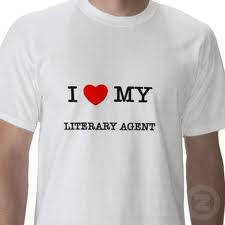Through agony and tears and, yes, joy, you've completed your novel. Or so you think. Until someone comes along and suggests that perhaps more work needs to be done. It's the last thing you want to hear. And so for a while you don't hear it. After some internal debate (usually prolonged), you accept that yes perhaps certain aspects of their advice have merit. But not all of it. They've misunderstood something integral.

When you're dealing with an actual agent or editor at a publishing house though, how do you stay true to your vision without shooting yourself in the foot or coming across as too difficult to work with?
But still the last thing you were expecting was to have your work interrogated so vigorously. It seems grossly unfair. You feel wrong-footed. You thought they liked it. You thought they liked you. You grow defensive and difficult. Where does that come from? That's irrelevant; it's there and somehow you're having to manage this defensive attitude as you go along.
This scenario got me to thinking of whether there is any advice out there for writers to master this part of the process, managing their own expectations and those of others. I couldn't find anything but here's what we came up with.
1. being clear on what your overall objective is with this book i.e. revolution, maintaining the status quo etc
2.being clear with what your overall objective is for your work going forward i.e. the psychology of family, education etc
3. developing one-liners that succinctly sum up the essential dynamic of your characters in your eyes
4. Establishing in advance of a meeting, or at the start, what specific area you will be focusing on together. Is this plot, characterization or something else?
Have you been through this? Do you have your own solutions? or techniques you can share with fellow writers and artists?
Signing Off,
(Editorial Manager)
good advice there Gonlor, especially that end part.
When you have finished your manuscript, give yourself a big pat on back, ( or go out and get pissed ) well-done, you have achieved the impossible. But this obsession to tell your story has cost you dearly.
You have spent countless hours writing, day and night.. You stopped watching television a long time ago, and also stopped buying newspapers; because you now spend your free time reading books of acclaimed authors. You haven't got a clue as to what's going on in the world; it could be overrun by aliens for all you know.
Never mind the fact the the wife has left you, the kids don't recognise you, the dog growls at you, and you've lost all your friends. It's because they fail to understand how much of an obsession writing is.
But now think of the advantages of being a miserable git that lives on your own. You can revert back to all your old habits: Fart to your hearts content, get sky sport and the porno channels, be an unhelpful neighbour and total recluse.
Once you have sobered up it is time for a reality check. You may think your book is ether good, really good, and you are hopeful that it will be highly-acclaimed.. Now comes the hard part. You have to be honest with yourself. Because all you have written is a first draft of a manuscript. It will need editing by a professional. You may do many redrafts. Do not get disheartened because you have already done most of the hard work. You should relish the thought that the race is almost won.
My tip once you have finished a manuscript is to tell yourself, 'I stll have at least a year to go, maybe longer to fine-tune it.' This will help keep you sane, and maintain your stamina.